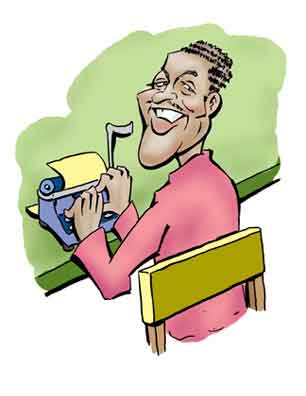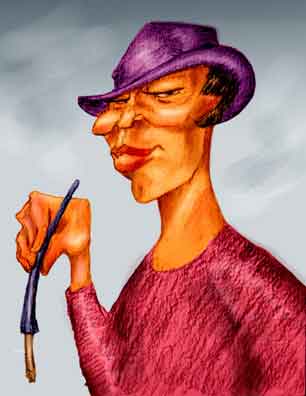Langston Hughes
Poetry for Everyone

Langston Hughes
Shoulda Been the Laureate
James Mercer Langston Hughes's early life was not the easiest. He was born in 1902 in Joplin, Missouri, but his parents separated when he was young. His mother moved frequently trying to find work, and before Langston was twelve, they had moved on the average of once every two years. Finally Langston (as he was called) and his mom ended up in Cleveland.
Langston came from a family that had been active in civil rights. The first husband of his maternal grandmother, Lewis Leary, was killed at Harper's Ferry fighting with John Brown. Her second husband had also been a militant abolitionist.
Because of his precarious family situation, Langston had to spend a lot of time with his grandmother and he took to reading as a way to pass the time. In school, Langston had shown an unusual ability to write poetry (his eighth grade class voted him their official poet) and when he graduated he began sending poetry to magazines. His first poem was published in The Crisis, which was (and is) the official publication of the National Association for the Advancement of Colored People (NAACP). So before he was twenty, Langston was recognized as a promising poet.
But writing poetry has never been the most remunerative of professions. So after high school, Langston took a number of menial, but by no means uninteresting jobs. He signed on to the crew of a freighter going to Africa, and rather than return to America right away, he spent some time in Paris.
Langston's dad - who moved to Mexico - wanted his son to be an engineer. But Langston wanted to be a writer. Although he attended Columbia University - which shows how affordable even an ivy league education was back then - he graduated from Lincoln University, then an all-black college about forty miles west and a little south of Philadelphia.
But as Langston told it, his big break came when he was working as a busboy at the Wardman Park Hotel in New York.
The poet Vachel Lindsay came in and as he was eating, Langston (who knew who Vachel was) placed some of his poems on the table. A bit irritated, Vachel nevertheless read one of the poems titled "Weary Blues".
Surprised at the quality of the verse, Vachel called Langston over.
"Who wrote this?" he asked.
"I did," Langston replied.
Vachel helped Langston get into touch with editors and publishers - which is much better than just sending in unsolicited manuscripts. Soon Langston had acquired a reputation as a serious and gifted poet. Then in 1925 he was given an award by Opportunity Magazine. At the awards banquet, Langston met another new writer, Zora Neal Hurston, who also was being presented an award.

Zora Neale Hurston
She did the writing.
After the Opportunity ceremony, Zora and Langston decided to collaborate on an opera. But soon they revised their plans to co-author a play which was to be a comedy featuring an African American cast. The play - Mule Bone - was duly written, and everything went along fine - for a while.
The problem was that most of the actual writing was by Zora, and the plot was also very much based on her hometown of Eatonville, Florida. So when it came time to get the play typed up and sent to a publisher (and find a theater), Zora thought she should get the credit as the author.
Now Langston never denied Zora did most of the actual writing, but he felt he had given sufficient input that he should get part credit - or at the very least, he should have part ownership of the copyright plus a portion of the royalties (Langston said he thought two-thirds for Zora and one-third for him was fair). Zora didn't completely disagree but she was a bit concerned that the typist - who was a very good friend of Langston - would also be credited as a co-author. Langston, though, assured her this would not happen.
Unfortunately, further discussion led nowhere. Finally Langston ended up calling in his attorney, and somehow the manuscript got sent without Langston's or Zora's knowledge to an amateur theatrical company (which loved the play and was planning the premiere). There was a multitude of phone calls, letters, and telegrams flying back and forth with a rapidity that anticipated E-mail, and Langston and Zora both filed for sole copyright (and both were granted it). Finally there was a highly acrimonious confrontation at the home of Langston's elderly mother where at one point Langston had to keep his mom from leaping out of bed and going after Zora.
In 1932, Langston ceded to Zora any copyright of the play. Sadly, Langston's concession did not restore his and Zora's friendship although later both expressed remorse at the schism. It wasn't until 1991 - after a lapse of 60 years - that Mule Bone was finally performed. Credited to both Zora and Langston it was not very successful nor did it receive very good reviews.
Langston's poetry, like that of W. H. Auden, can be enjoyable even for people who don't like poetry. Although universally lauded today, when he was young, Langston's poetry was often criticized in the black press because it dealt with issues and people from the lower economic classes. Another criticism was that he sometimes wrote - as they say - "in dialect" which some critics saw as emphasizing the "imperfections" of black culture. Of course what he was really writing about was the everyday people of black America (that was the whole point), and writing using dialect was certainly no different than what other American writers like Mark Twain were doing.
Langston didn't write just poetry, of course. He also wrote plays, essays, articles, novels, and even children's books. Like many writers of the early 20th century, Langston's politics were far to the left. In the early 1930's he spent a year in Russia and later went to Spain during the Spanish Civil War. His politics moderated a bit after World War II.
In the 1950's it was inevitable that Langston would be called before the Senate committees trying to seek out subversives, communists, and left-wingers. Unlike Paul Robeson - whose appearance was combative, even hostile - Langston simply testified he had never been a member of the Communist Party and even said he now thought some of his more militant poetry was ill-advised. Never one to personally seek out controversy, he found himself at odds with the ever growing militancy of the younger black activities in the 1960's.
Langston died on May 22, 1967 at the Polyclinic Hospital in in Manhattan. Although he had received recognition at an early age, he had found the job of being a famous poet was not that lucrative a calling. But at least Langston was able to make a living at it.
References
Life of Langston Hughes, Volume 1: 1902 - 1941 Volume 2: 1941-1967, Arnold Rampersand, Oxford University Press, 2002.
"Langston Hughes Biography - African-American Writer, Poet, Kansan: February 1, 1902 - May 22, 1967, kansasheritage.org
The Oxford Companion to African American Literature, Arnold Rampersad, Oxford University Press, 1997.
"Langston Hughes: 1902 - 1967", Poetry Foundation. A very good online biography with some poems and articles by Langston and other good references.
"Langston Hughes, Writer, 65, Dead", New York Times, May 23, 1967.
Wrapped In Rainbows: The Life of Zora Neale Hurston, Valerie Boyd, Scribner, 2003.